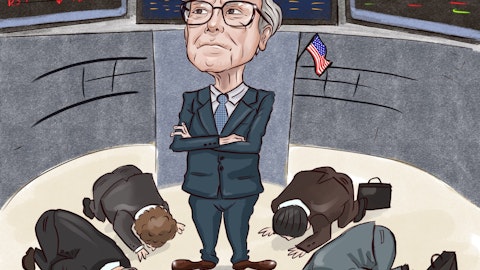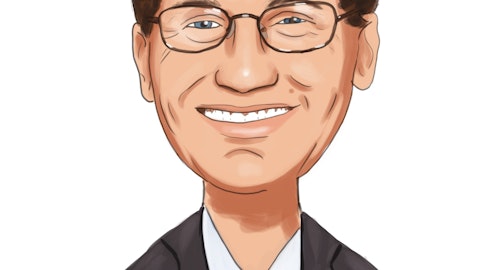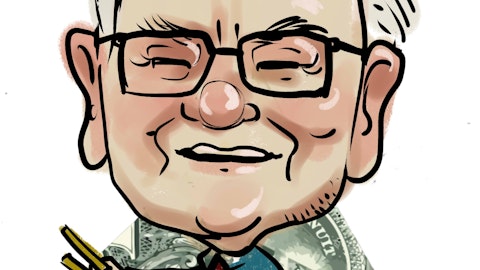In this article, we discuss Warren Buffett’s worst investments of all time. If you want to skip our detailed analysis of these investments, go directly to Warren Buffett’s 5 Worst Investments of All Time.
Warren Buffett, the legendary investor from Omaha with a worth of over $108 billion, is the first to admit when he makes mistakes. In the finance world, where passing the buck on to executives and lower-level employees is all too common in large corporations, Buffett has established a tradition of honesty that has earned the admiration of the broader industry, making him one of the most trustworthy voices on the overall market dynamics. Even though he likes to admit he is human, the successful returns on his investment portfolio would suggest otherwise.
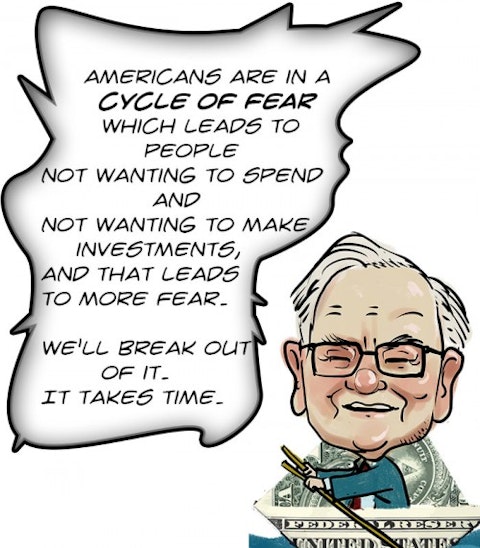
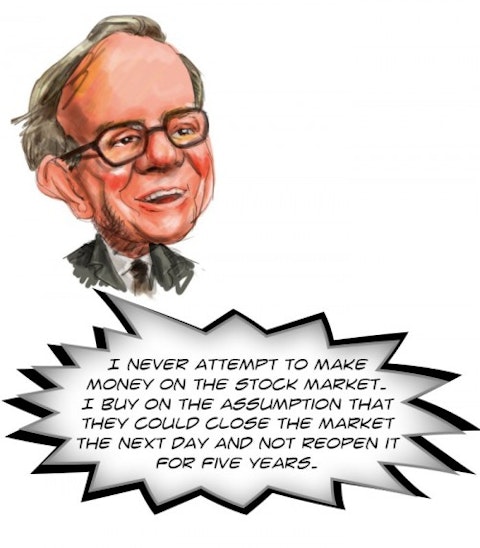
Buffett leads Berkshire Hathaway Inc. (NYSE: BRK-A), the Nebraska-based holding company that owns stakes in many top firms on the market, including Apple Inc. (NASDAQ: AAPL), Bank of America Corporation (NYSE: BAC), and The Coca-Cola Company (NYSE: KO), among others. Apple Inc. (NASDAQ: AAPL), Bank of America Corporation (NYSE: BAC), and The Coca-Cola Company (NYSE: KO) together represent close to three quarters of the investment portfolio of Berkshire Hathaway Inc. (NYSE: BRK-A), latest filings reveal.
Buffett, now 90 years-old, has been trading in stocks as a professional for over four decades and has pioneered an investment strategy that places emphasis on long-term value of companies based on the competitive edge they offer in terms of products. This has proved to be a winning philosophy in the long term — the stocks picks of Buffett have outperformed industry benchmarks like the S&P 500 by close to 10% in terms of compounded annual gain between 1965-2020 — but his company has underperformed the market in the last decade or so.
This dip in form has largely been attributed to a failure on part of Berkshire Hathaway Inc. (NYSE: BRK-A) to jump on the technology stock rally that has been responsible for the majority of market growth in the last ten years — more than 20% of the S&P 500 is now just made up of five big technology companies — and a reluctance to shed big finance shares that have been hit by the rise of fintech and crypto.

However, Buffett is not one who dwells on these mistakes too much, preferring to learn from them and move on.
“You’re going to make mistakes in life, there’s no question about it. You don’t want to make them on the big decisions, who you marry and things like that. So there’s no way I’m going to make a lot of business and investment decisions without making some mistakes. I may try to minimize them. I don’t dwell on them at all. I don’t look back.”
In recent years, Buffett has appeared to admit his mistakes in this regard, telling a shareholder meeting in 2018 that he was wrong not to buy Amazon.com, Inc. (NASDAQ: AMZN) and Alphabet Inc. (NASDAQ: GOOG) shares when he had the chance to do so at opportune prices. Amazon.com, Inc. (NASDAQ: AMZN) and Alphabet Inc. (NASDAQ: GOOG) are two of the largest companies in the world at the moment, with most market analysts bullish on their long-term future in a world where digital offerings are priced higher than gold.
However, despite the admission, a reluctance to invest in businesses that he does not completely understand has still held Buffett back from pursuing these high growth stocks. In 2018, at the same annual shareholding meeting where he admitted his failures on Amazon.com, Inc. (NASDAQ: AMZN) and Alphabet Inc. (NASDAQ: GOOG), Buffett said that Jeff Bezos, the owner of Amazon.com, Inc. (NASDAQ: AMZN), had done a remarkable job at the helm of the tech firm, performing something close to a miracle.
“I’ve watched Amazon from the start. I think what Jeff Bezos has done is something close to a miracle. The problem is when I think something will be a miracle, I tend not to bet on it. It would have been far better obviously if I had some insights into certain businesses.”

Jeff Bezos
Buffett is now nearing the end of his career and has already pretty much handed over the control of his company to a younger generation of successors who have already begun to explore their own investment ideas. It remains to be seen whether they can successfully transform Berkshire Hathaway Inc. (NYSE: BRK-A) to keep up with the times. The market has changed so much since Buffett first started investing that it is no easy task. Even established financial institutions are finding life difficult at the moment.
The entire hedge fund industry is feeling the reverberations of the changing financial landscape. Its reputation has been tarnished in the last decade, during which its hedged returns couldn’t keep up with the unhedged returns of the market indices. On the other hand, Insider Monkey’s research was able to identify in advance a select group of hedge fund holdings that outperformed the S&P 500 ETFs by more than 124 percentage points since March 2017. Between March 2017 and February 26th 2021 our monthly newsletter’s stock picks returned 197.2%, vs. 72.4% for the SPY. Our stock picks outperformed the market by more than 124 percentage points (see the details here). We were also able to identify in advance a select group of hedge fund holdings that significantly underperformed the market. We have been tracking and sharing the list of these stocks since February 2017 and they lost 13% through November 16th. That’s why we believe hedge fund sentiment is an extremely useful indicator that investors should pay attention to. You can subscribe to our free newsletter on our homepage to receive our stories in your inbox.
With this context in mind, here is our list of Warren Buffett’s worst investments of all time.
Warren Buffett’s Worst Investments of All Time
10. ConocoPhillips (NYSE: COP)
Number of Hedge Fund Holders: 51
ConocoPhillips (NYSE: COP) is a Texas-based mining company founded in 1875. It is placed tenth on our list of Warren Buffett’s worst investments of all time. The stock has returned more than 42% to investors over the course of the past year. The company is primarily engaged in the exploration of hydrocarbons like oil and natural gas. Buffett bought a stake in the company in 2008 when oil prices were all-time highs, making an investment worth $7 billion in the company at the time.
However, ConocoPhillips (NYSE: COP) stock slipped afterwards as oil prices fell down again. Buffett lost nearly $2 billion in the deal when he sold his stake later. Buffett afterwards admitted he had been swept up in the euphoria of rocketing oil prices when buying the stock.
Out of the hedge funds being tracked by Insider Monkey, Washington-based investment firm Fisher Asset Management is a leading shareholder in ConocoPhillips (NYSE: COP) with 5.3 million shares worth more than $282 million. .
In its Q1 2021 investor letter, ClearBridge Investments, an asset management firm, highlighted a few stocks and ConocoPhillips (NYSE: COP) was one of them. Here is what the fund said:
“While reducing in health care and consumer staples, we increased our exposure to high-quality names in economically sensitive areas of the market. We added to low-cost, high-quality energy names (including) ConocoPhillips. We are positive on the company’s strong balance sheets, competitive positions and exposure to an economic recovery.”
9. The Kraft Heinz Company (NASDAQ: KHC)
Number of Hedge Fund Holders: 33
The Kraft Heinz Company (NASDAQ: KHC) is a Chicago-based company that sells food and beverage products. It is ranked ninth on our list of Warren Buffett’s worst investments of all time. The company’s shares have offered investors returns exceeding 35% over the past twelve months. The Kraft Heinz Company (NASDAQ: KHC) was formed as a result of a Buffett-sponsored merger between Kraft and Heinz back in 2015. Buffett owns a 26% stake in the food giant that he purchased for $9.8 billion.
In 2009, during an interview with news broadcaster CNBC, Buffett admitted that he had made a mistake with The Kraft Heinz Company (NASDAQ: KHC), buying at too high a price for a business that was expensive and had been hit by competition from other retailers. By 2019, The Kraft Heinz Company (NASDAQ: KHC) had lost close to half in value since Buffett purchased the stock. However, Buffett is still in a profitable position in the firm given the dividend payments and overall capital gains that he is yet to realize.
Out of the hedge funds being tracked by Insider Monkey, Nebraska-based investment firm Berkshire Hathaway is a leading shareholder in The Kraft Heinz Company (NASDAQ: KHC) with 325 million shares worth more than $13 billion.
Just like Apple Inc. (NASDAQ: AAPL), Bank of America Corporation (NYSE: BAC), and The Coca-Cola Company (NYSE: KO), The Kraft Heinz Company (NASDAQ: KHC) is on Warren Buffett’s list of investments.
In its Q4 2020 investor letter, Berkshire Hathaway highlighted a few stocks and The Kraft Heinz Company (NASDAQ: KHC) was one of them. Here is what the firm said:
“We exclude our Kraft Heinz holding — 325,442,152 shares — (In the list of 15 common stock investments that at yearend were our largest in market value) because Berkshire is part of a control group and therefore must account for that investment using the “equity” method. On its balance sheet, Berkshire carries the Kraft Heinz holding at a GAAP figure of $13.3 billion, an amount that represents Berkshire’s share of the audited net worth of Kraft Heinz on December 31, 2020.
Berkshire and its subsidiaries hold investments in certain businesses that are accounted for pursuant to the equity method. Currently, the most significant of these is our investment in the common stock of The Kraft Heinz Company (“Kraft Heinz”). Kraft Heinz is one of the world’s largest manufacturers and marketers of food and beverage products, including condiments and sauces, cheese and dairy, meals, meats, refreshment beverages, coffee and other grocery products. Berkshire currently owns 325,442,152 shares of Kraft Heinz common stock representing 26.6% of the outstanding shares.
We recorded equity method earnings from our investment in Kraft Heinz of $95 million in 2020, $493 million in 2019 and losses of approximately $2.7 billion in 2018. Equity method earnings (losses) included the effects of goodwill and identifiable intangible asset impairment charges recorded by Kraft Heinz. Our share of such charges was approximately $850 million in 2020, $450 million in 2019 and $3.7 billion in 2018. We received dividends from Kraft Heinz of $521 million in each of 2020 and 2019 and $814 million in 2018, which we recorded as reductions in our carrying value.
Shares of Kraft Heinz common stock are publicly-traded and the fair value of our investment was approximately $11.3 billion at December 31, 2020 and $10.5 billion at December 31, 2019. The carrying value of our investment was approximately $13.3 billion at December 31, 2020 and $13.8 billion at December 31, 2019. As of December 31, 2020, the carrying value of our investment exceeded the fair value based on the quoted market price by $2.0 billion (15% of carrying value). In light of this fact, we evaluated our investment in Kraft Heinz for impairment. We utilize no bright-line tests in such evaluations. Based on the available facts and information regarding the operating results of Kraft Heinz, our ability and intent to hold the investment until recovery, the relative amount of the decline and the length of time that fair value was less than carrying value, we concluded that recognition of an impairment loss in earnings was not required. However, we will continue to monitor this investment and it is possible that an impairment loss will be recorded in earnings in a future period based on changes in facts and circumstances or intentions.”
8. Tesco PLC (LSE: TSCO.L)
Number of Hedge Fund Holders: N/A
Tesco PLC (LSE: TSCO.L) is a United Kingdom-based grocery retailer founded in 1919. It is placed eight on our list of Warren Buffett’s worst investments of all time. The stock has returned more than 4% to investors over the past three months. Buffett first invested in the grocery retailer in 2006, purchasing a small stake in the company for over $320 million. He subsequently increased his holdings for the next few years, spending more than $2.3 billion for an additional share in the company at one point despite several warnings about profit.
However, as Tesco PLC (LSE: TSCO.L) started reporting accounting problems and share price slid rapidly 2013 onwards, Buffett started shedding the stock. In 2015, in a letter to shareholders, Buffett admitted that he had made a mistake on Tesco, selling too late and costing Berkshire $444 million in losses.
Just like Apple Inc. (NASDAQ: AAPL), Bank of America Corporation (NYSE: BAC), and The Coca-Cola Company (NYSE: KO), Tesco PLC (LSE: TSCO.L) is on Warren Buffett’s list of investments.
7. U.S. Bancorp (NYSE: USB)
Number of Hedge Fund Holders: 43
U.S. Bancorp (NYSE: USB) is a Minnesota-based bank holding company founded in 1968. It is ranked seventh on our list of Warren Buffett’s worst investments of all time. The company’s shares have returned more than 56% to investors over the past twelve months. Buffett owns more than 129 million shares in the banking company through Berkshire Hathaway Inc. (NYSE: BRK-A) worth over $7 billion. This represents close to 2% of their investment portfolio. In the first quarter of 2021, Buffett trimmed his position in the firm by over 1%.
In the preceding quarter, the Oracle of Omaha had shed 0.6% of his stake in U.S. Bancorp (NYSE: USB), following a broader strategy that saw him dump many key financial stocks from his portfolio over the period. The total returns of the bank have not outperformed the wider market in close to two decades, but Buffett has held onto the stock.
Just like Apple Inc. (NASDAQ: AAPL), Bank of America Corporation (NYSE: BAC), and The Coca-Cola Company (NYSE: KO), U.S. Bancorp (LSE: 0LHY.L) is on Warren Buffett’s list of investments.
6. International Business Machines Corporation (NYSE: IBM)
Number of Hedge Fund Holders: 41
International Business Machines Corporation (NYSE: IBM) is a New York-based computer hardware company founded in 1911. It is placed sixth on our list of Warren Buffett’s worst investments of all time. The stock has offered investors returns exceeding 23% over the course of the past year. Buffett started investing in International Business Machines Corporation (NYSE: IBM) back in 2011, purchasing 64 million shares at the time for over $10 billion. He held onto the stock for the next several years.
However, a shift to cloud from traditional IT solutions hammered International Business Machines Corporation (NYSE: IBM) in the years following the investment, who insisted the company would weather the storm. However, Buffett changed track in 2017 and 2018, shedding a majority of his IBM stake. At the time he sold it, the shares of the tech firm had dropped more than 18% in value since his purchase, compared to a 116% increase in the S&P 500.
Out of the hedge funds being tracked by Insider Monkey, Boston-based investment firm Arrowstreet Capital is a leading shareholder in International Business Machines Corporation (NYSE: IBM) with 3.6 million shares worth more than $482 million.
Just like Apple Inc. (NASDAQ: AAPL), Bank of America Corporation (NYSE: BAC), and The Coca-Cola Company (NYSE: KO), International Business Machines Corporation (NYSE: IBM) is on Warren Buffett’s list of investments.
In its Q2 2020 investor letter, Distillate Capital, an asset management firm, highlighted a few stocks and International Business Machines Corporation (NYSE: IBM) was one of them. Here is what the fund said:
“AT&T and IBM exited the portfolio as they no longer met the quality criteria for inclusion with AT&T exceeding the debt limit and IBM falling out due to deteriorating long-term fundamental stability.”
Click to continue reading and see Warren Buffett’s 5 Worst Investments of All Time.
Suggested Articles:
- 15 Most Valuable Alcohol Companies
- Chuck Akre’s Top 10 Stock Holdings
- Billionaire Julian Robertson’s Top 10 Stocks
Disclose. None. Warren Buffett’s Worst Investments of All Time is originally published on Insider Monkey.
